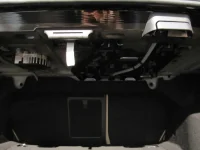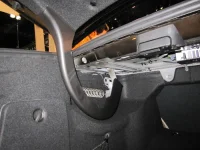miamig35sedan
Hasn't posted much yet...
- Joined
- Dec 29, 2009
- Messages
- 2
- Reaction score
- 0
- Points
- 0
After having test drove a 2010 3.8 I'm seriously considering one with the Premium and Tech packages. I would purchase and keep 8 to 10 years, driving about 12,000 to 14,000 miles annually (I'm meticulous about maintenance and will DIY things like oil, air filter, and cabin filter changes).
Before the Genesis, everything I looked at was $50,000 to $58,000 new, and even though I can afford this price point I just can't wrap my head around spending this kind of money for a depreciating daily driver. This means I either have to buy CPO or look for a differently branded lower price point vehicle without compromising the luxury size and amenities I want . . . enter the Genesis.
My experience with Hyundai as a brand is limited and mixed. I rented a late model Sonata (4 cylinder) on a family trip and was underwhelmed. It was reliable and fuel efficient, but did not seem as well designed or as "fully baked" as say a Camry or Accord. On the other hand, I know 4 Hyundai drivers (Sonata V6, Azeera, Tiburon, and Tucson?) and a Kia Sorento driver who swear by their cars and haven't had any issues at all.
I'm trying to figure out why the Genesis is $15,000 less than the competition (with a better warranty to boot) and have broken down to 3 possible elements. I would like to know your thoughts on whether I'm accurate and to what degree each plays in this price differential.
1) Less R&D vs. the competition. Part of what you pay with Lexus, Infiniti, BMW, etc. is the cost of development and R&D in areas such as suspension tuning, engine design, manufacturing technologies, electronics, etc. I see this already in things like the need to remove a manifold just to change spark plugs, or the plastic oil filter cap, etc.
2) Vehicle Branding. Part of what you pay with Lexus, Infiniti, BMW, etc. is just the name or status symbol.
3) Dealership Branding. Part of what you pay with Lexus, Infiniti, BMW, etc. is to cover the cost of a separate low volume, high operting cost dealership network and "luxury" service department.
What am I missing?
Before the Genesis, everything I looked at was $50,000 to $58,000 new, and even though I can afford this price point I just can't wrap my head around spending this kind of money for a depreciating daily driver. This means I either have to buy CPO or look for a differently branded lower price point vehicle without compromising the luxury size and amenities I want . . . enter the Genesis.
My experience with Hyundai as a brand is limited and mixed. I rented a late model Sonata (4 cylinder) on a family trip and was underwhelmed. It was reliable and fuel efficient, but did not seem as well designed or as "fully baked" as say a Camry or Accord. On the other hand, I know 4 Hyundai drivers (Sonata V6, Azeera, Tiburon, and Tucson?) and a Kia Sorento driver who swear by their cars and haven't had any issues at all.
I'm trying to figure out why the Genesis is $15,000 less than the competition (with a better warranty to boot) and have broken down to 3 possible elements. I would like to know your thoughts on whether I'm accurate and to what degree each plays in this price differential.
1) Less R&D vs. the competition. Part of what you pay with Lexus, Infiniti, BMW, etc. is the cost of development and R&D in areas such as suspension tuning, engine design, manufacturing technologies, electronics, etc. I see this already in things like the need to remove a manifold just to change spark plugs, or the plastic oil filter cap, etc.
2) Vehicle Branding. Part of what you pay with Lexus, Infiniti, BMW, etc. is just the name or status symbol.
3) Dealership Branding. Part of what you pay with Lexus, Infiniti, BMW, etc. is to cover the cost of a separate low volume, high operting cost dealership network and "luxury" service department.
What am I missing?
Last edited:













